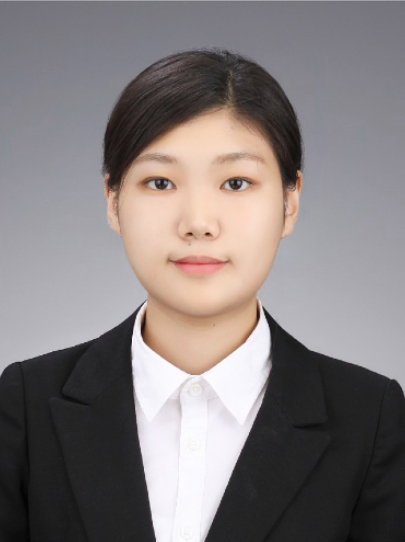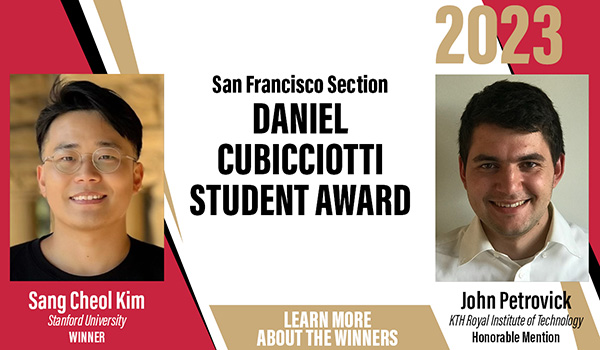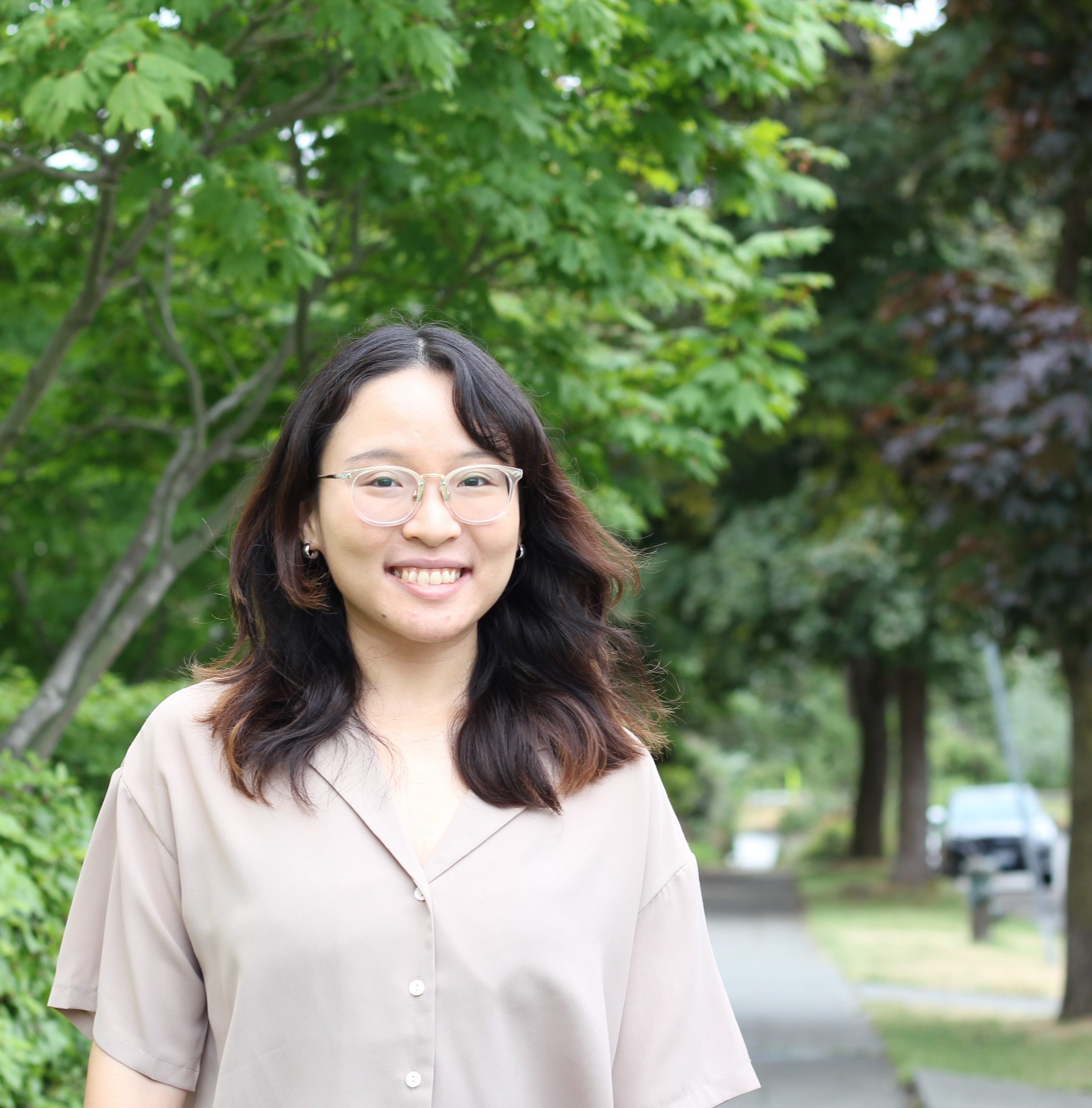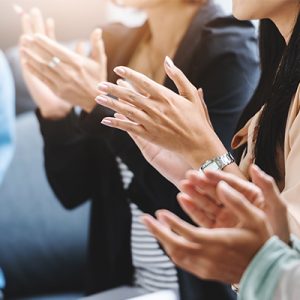 Congratulations to the 2024 ECS Canada Section Student Award winners, Anu Adamson, Dalhousie University, for her contributions to the understanding and eliminating self-discharge in Li-ion and Na-ion batteries, and Shipeng Jia, McGill University, for contributions to the field of electrochemistry and energy storage materials and excellent achievements in advancing sodium and lithium-ion battery research.
Congratulations to the 2024 ECS Canada Section Student Award winners, Anu Adamson, Dalhousie University, for her contributions to the understanding and eliminating self-discharge in Li-ion and Na-ion batteries, and Shipeng Jia, McGill University, for contributions to the field of electrochemistry and energy storage materials and excellent achievements in advancing sodium and lithium-ion battery research.
Justin C. Bui Receives 2024 ECS San Francisco Section Daniel Cubicciotti Student Award
Posted on June 3, 2024 by Genevieve Goldy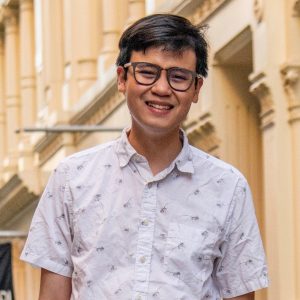 Congratulations to the 2024 San Francisco Section Daniel Cubicciotti Student Award Recipient, Justin C. Bui of the University of California, Berkeley and Lawrence Berkeley National Laboratory. The award recognizes his outstanding work on developing continuum models, understanding the impact of transport and catalysis in bipolar ion-conducting polymer membranes, and elucidating the influence of the microenvironment on the activity and selectivity for the electrochemical reduction of CO2.
Congratulations to the 2024 San Francisco Section Daniel Cubicciotti Student Award Recipient, Justin C. Bui of the University of California, Berkeley and Lawrence Berkeley National Laboratory. The award recognizes his outstanding work on developing continuum models, understanding the impact of transport and catalysis in bipolar ion-conducting polymer membranes, and elucidating the influence of the microenvironment on the activity and selectivity for the electrochemical reduction of CO2.
Justin C. Bui
Justin C. Bui is a fifth year PhD candidate at UC Berkeley and researcher in the Liquid Sunlight Alliance U.S. Department of Energy Hub at Lawrence Berkeley National Laboratory. Justin earned his BS in Chemical Engineering from Columbia University, working with Prof. Daniel Esposito to fabricate membrane-less electrolyzers for sustainable hydrogen production from seawater. At Berkeley, Justin’s research with Prof. Alexis Bell and Dr. Adam Weber focuses on the use of continuum-level theory to understand the impact of transport and catalysis in bipolar ion-conducting polymer membranes, as well as to elucidate the influence of the catalytic microenvironment on the activity and selectivity of carbon dioxide (CO2) electroreduction to value-added chemical products. Throughout his PhD, Justin worked closely with experimentalists to drastically advance the development of carbon capture and conversion devices. Justin received prestigious National Science Foundation (NSF) and National Defense Science and Engineering Graduate (NDSEG) research fellowships. Outside of the lab, Justin developed inclusive, experiential curricula to introduce K-12 students to electrochemistry. He will soon start as a postdoctoral scholar at the California Institute of Technology, working with Prof. Karthish Manthiram to develop electrochemical reactors capable of oxidatively activating nitrogen to make plastics and fertilizer precursors directly from air. (more…)
The Society and ECS Korea Section congratulate the 2024 Korea Section Student Award winner, Minji Kim. The award recognizes Minji’s significant contributions to elucidating the degradation mechanisms of cathode materials in lithium ion batteries.
Join us in congratulating Minji! We wish her continued success in her electrochemistry and solid state science studies and research.
Minji Kim
Minji Kim is enrolled in the integrated Energy Science and Engineering MS and PhD program at Sungkyunkwan University (SKKU), where she started in the fall of 2018. Her research under Professor Won-Sub Yoon’s supervision at the SKKU Energy Conversion & Storage Materials Laboratory (ECSML) focuses on analyzing the capacity degradation mechanisms of cathode materials for lithium ion batteries using synchrotron x-ray. Her investigation of capacity degradation during long-term high-temperature cycles in a pouch full cell system, employing commercial Ni-rich layered cathode materials and graphite anode materials, was published in 2023 in Advanced Energy Materials (13, 41, 2302209). Minji also conducts ongoing research on various mechanisms of both commercial cathode materials and next-generation cathode materials, including Li-rich disordered materials. (more…)
ECS Announces 2023 San Francisco Section Daniel Cubicciotti Student Award Recipients
Posted on October 2, 2023 by Genevieve GoldyDoris Hung Wins 2023 Pacific Northwest Section Electrochemistry Student Award
Posted on September 5, 2023 by Genevieve GoldySponsored by Thermo Fisher Scientific
The ECS Pacific Northwest Section is pleased to announce that Chih-Hsuan (Doris) Hung of the University of Washington received the 2023 Pacific Northwest Section Electrochemistry Student Award Sponsored by Thermo Fisher Scientific.
The award recognizes Hung’s contributions to modeling, analysis, and design of three-dimensional Lithium ion batteries (LIBs) and her contributions to K-12 education through the development and dissemination of science and engineering educational materials with an emphasis on clean energy and inclusivity. (more…)
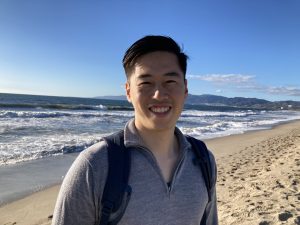 Congratulations to Sho Fujita of Queen’s University, Canada, recipient of the 2022 ECS Canada Section Student Award! For over 20 years, the section has recognized promising young engineers and scientists in the field of electrochemical power sources with this award. To qualify, students must be pursuing PhDs at Canadian universities in any area of science or engineering in which electrochemical science and technology and/or solid state science and technology is the central consideration. A Canadian university faculty member nominates them.
Congratulations to Sho Fujita of Queen’s University, Canada, recipient of the 2022 ECS Canada Section Student Award! For over 20 years, the section has recognized promising young engineers and scientists in the field of electrochemical power sources with this award. To qualify, students must be pursuing PhDs at Canadian universities in any area of science or engineering in which electrochemical science and technology and/or solid state science and technology is the central consideration. A Canadian university faculty member nominates them.
Mitchell Kaiser Receives 2022 ECS Pacific Northwest Section Electrochemistry Student Award
Posted on May 31, 2022 by Genevieve Goldy The winner of the first ECS Pacific Northwest Section Electrochemistry Student Award has been named: Mitchell Kaiser of the University of Washington. Join us in congratulating him! Kaiser will receive the award at this summer’s ECS Pacific Northwest Section meeting.
The winner of the first ECS Pacific Northwest Section Electrochemistry Student Award has been named: Mitchell Kaiser of the University of Washington. Join us in congratulating him! Kaiser will receive the award at this summer’s ECS Pacific Northwest Section meeting.
The section established the award in 2021 to recognize promising young engineers and scientists pursuing PhDs in electrochemical engineering and applied electrochemistry, and to encourage recipients to continue careers in these fields. The winner receives a US $1,000 prize. Visit the award page for the full award description. (more…)
Ik Seon Kwon Receives 2021 ECS Korea Section Student Award
Posted on June 1, 2021 by Genevieve Goldy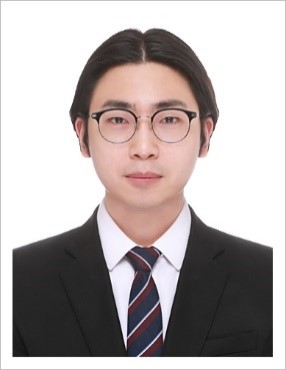 Ik Seon Kwon, a PhD student at Korea University, South Korea, is the recipient of the 2021 ECS Korea Section Student Award. The award recognizes a Korean University PhD student for their academic accomplishments in any area of science or engineering in which electrochemical and/or solid state science and technology is the central consideration.
Ik Seon Kwon, a PhD student at Korea University, South Korea, is the recipient of the 2021 ECS Korea Section Student Award. The award recognizes a Korean University PhD student for their academic accomplishments in any area of science or engineering in which electrochemical and/or solid state science and technology is the central consideration.
The ECS Korea Section Student Award
The section established the award, which is bestowed annually, in 2005. The winner receives a $500 USD prize which is awarded at an ECS Korea Section meeting. The award recipient may be asked to speak at that meeting on a subject of major interest to him/her in the field of electrochemical and/or solid state science and technology. (more…)
Deadline for 2020 ECS Corrosion Division Award Nominations is December 15
Posted on December 5, 2019 by Frances ChavesNominations are due by December 15 for two ECS Corrosion Division awards :
ECS Corrosion Division Morris Cohen Graduate Student Award
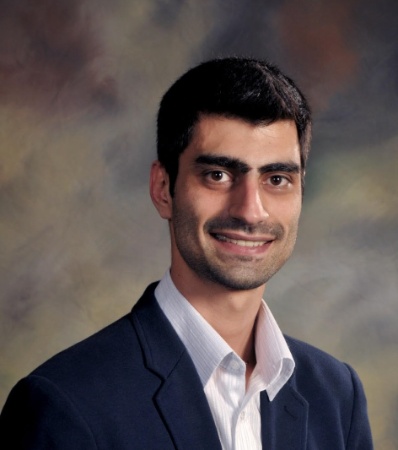
Aria Kahyarian, 2019 Morris Cohen Graduate Student Award winner
The Corrosion Division Morris Cohen Graduate Student Award was established in 1991 to recognize and reward outstanding graduate research at the Masters or PhD level in the field of corrosion science and/or engineering. The award—a framed certificate and $1,000—is open to graduate students who have successfully completed all requirements for their degrees, as testified by their advisors, within a period of two years prior to the nomination submission deadline.
Aria Kahyarian received the 2019 Corrosion Division Morris Cohen Graduate Student Award at the 236th ECS Meeting. There he presented his award talk, “Active Metallic Corrosion in Weak Acid Solutions: A Unified Mechanistic View to Cathodic Reactions.” Aria Kahyarian earned his BSc in chemical engineering from Sharif University of Technology in 2011. In 2018, he received his PhD in chemical engineering from Ohio University under the direction of Professor Srdjan Nesic at the Institute for Corrosion and Multiphase Flow Technology.
ECS Corrosion Division Herbert H. Uhlig Award
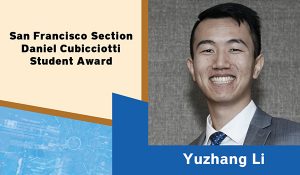 The 2018 San Francisco Section Daniel Cubicciotti Student Award Goes to Yuzhang Li!
The 2018 San Francisco Section Daniel Cubicciotti Student Award Goes to Yuzhang Li!
Yuzhang Li is a PhD student working with Professor Yi Cui on next-generation energy storage technologies at Stanford University. His research approach seeks to tackle problems from both an applied and fundamental perspective, which is necessary for the development of high energy density batteries. (more…)


